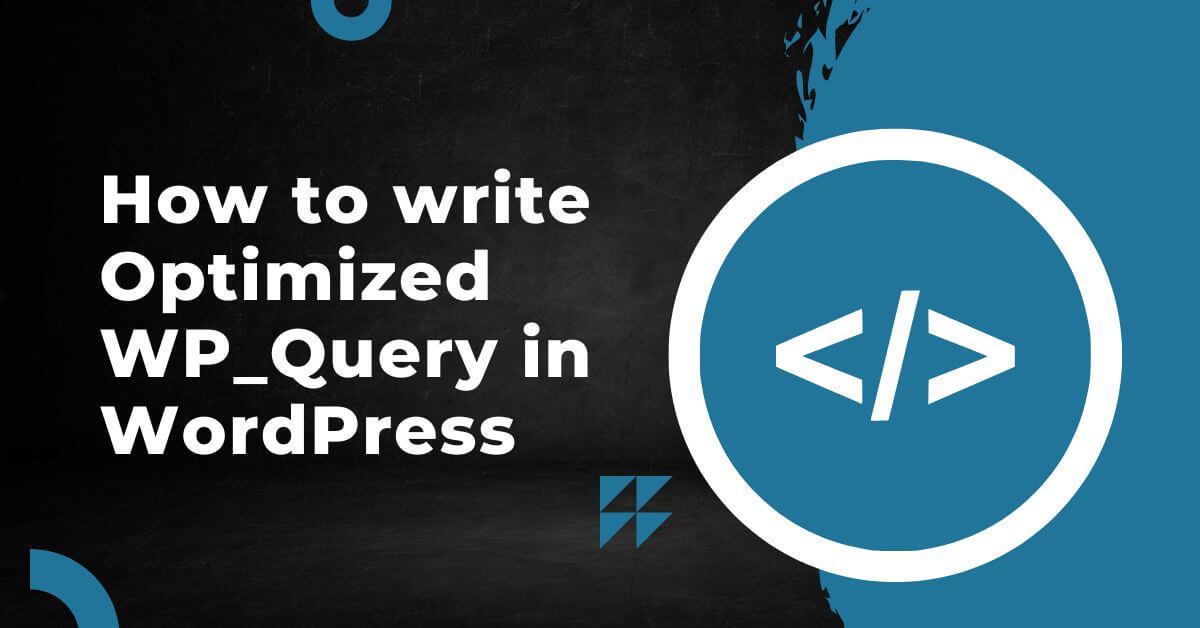WordPress comes with lots of built-in functionalities. And one of the most used functionality is the WP_Query class. We play around WP_Query every day. Today let’s see how to write optimized WP_Query in WordPress?
Table of Contents
What is WP_Query?
WP_Query is WordPress’s default PHP class to create queries for posts, pages, custom post types, authors, and many more. With the help of WP_Query, we do not need to write a separate database query for our needs. It allows us to build a complex search from the database and give the response.
WP_Query is used with the loop. WP_Query has many arguments to build a query that sometimes makes it heavy to search. That’s why today we will see how to use WP_Query class efficiently and write an optimized way.
WP_Query default structure
We can use WP_Query by creating an instance of the class with the required arguments $args. You must pass the arguments in $args to fetch the data.
<?php
// WP_Query
$query = new WP_Query( $args );
if ( $query->have_posts() ) :
while ( $query->have_posts() ) : $query->the_post();
?>
<h2><?php the_title(); ?></h2>
<?php
endwhile;
wp_reset_postdata();
else:
// No any post found!
endif;
?>Get the recent 5 posts
Now let’s see about the arguments in some detail, and how can you use them. We will get the recent 5 posts with WP_Query.
<?php
// WP_Query
$args = [
'post_type' => 'post',
'post_status' => 'publish',
'posts_per_page' => '5',
'orderby' => 'date',
'order' => 'DESC',
];
$query = new WP_Query( $args );
if ( $query->have_posts() ) :
while ( $query->have_posts() ) : $query->the_post();
?>
<div class="posts-wrap">
<h2><?php the_title(); ?></h2>
</div>
<?php
endwhile;
wp_reset_postdata();
else:
// No any post found!
endif;
?>In the above example, we have used multiple arguments to get 5 recent posts. Let’s discuss them one by one.
- post_type: Post type name like the
post,page,attachment,revision, etc; - post_status: Post status like
publish,draft,pending, etc. - posts_per_page: Number of posts needed.
- orderby: Order post by the
date,title,ID, etc. - order:
ASC,DESC. Ascending or Descending order.
Most used queries in WP_Query
We can also make the query with the below queries.
- Taxonomy query(tax_query): With the help of tax_query we can get the post by particular category/categories. We can include and exclude the category in the array.
Refer to this: https://developer.wordpress.org/reference/classes/wp_query/#taxonomy-parameters - Meta fields(meta_query): With the help of meta_query we can get the post based on meta values. Like if we want to get the post of the particular meta field value.
- Date query(date_query): We the help of this date_query we can get the post by the particular date and time.
Refer to this: https://developer.wordpress.org/reference/classes/wp_query/#taxonomy-parameters
Refer to their official documents for more details.
Write optimized WP_Query
Here I’m sharing the most awaited things about optimized WP_Query. Here is something you need to know when you write the WP_Query.
- Always avoid
'posts_per_page' => '-1'in the query. Keep the appropriate number. What if the post count is 50000? That will cause the site performance. - Use
'no_found_rows' => truewhen you are not using pagination. That will not run the extra database query to get the post count and the number of pages for pagination. - Use
'fields' => 'ids'when you need only the post ID. - Use
'update_post_meta_cache' => false, when you don’t require the meta. - Use
'update_post_term_cache' => false, when the taxonomy term is not used.
So let’s see again a small example:
<?php
// WP_Query
$args = [
'post_type' => 'post',
'post_status' => 'publish',
'posts_per_page' => '5',
'orderby' => 'date',
'order' => 'DESC',
'no_found_rows' => true,
'update_post_meta_cache' => false,
'update_post_term_cache' => false,
'fields' => 'ids',
];
$query = new WP_Query( $args );
if ( $query->have_posts() ) :
while ( $query->have_posts() ) : $query->the_post();
?>
<div class="posts-wrap">
<h2><?php the_title(); ?></h2>
</div>
<?php
endwhile;
wp_reset_postdata();
else:
// No any post found!
endif;
?>So this way you can write an optimized WP_Query. That will give you a better performance.
Avoid post__not_in
We use post__not_in for not including that post in a query. We probably use this functionality on the article page. So when we show a recent post or some particular posts then we can exclude the current post from it.
If we use post__not_in in our query then every time that query will leverage a unique cache for all posts and that will affect site performance. So instead of that we can check that thing in a loop and can filter the not needed posts. See the below example.
$args = array(
'post_type' => 'page',
'post_status' => 'publish',
'posts_per_page' => 5 + count( $exclude_posts ), // $exclude_posts is an array of post IDs
'no_found_rows' => true,
);
$query = new WP_Query( $args );
while ( $query->have_posts() ) {
$query->the_post();
$current_post = get_the_ID();
if ( in_array( $current_post, $exclude_posts ) ) {
continue;
}
the_title( '<h2><a href="' . get_permalink() . '">', '</a></h2>');
}
wp_reset_postdata();Hope you like the article!
Must Read:

